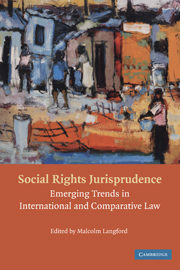Book contents
- Frontmatter
- Contents
- Foreword – Philip Alston
- Preface
- PART ONE OVERVIEW
- 1 The Justiciability of Social Rights: From Practice to Theory
- 2 The Challenges of Crafting Remedies for Violations of Socio-Economic Rights
- 3 The Right to Legal Aid in Social Rights Litigation
- PART TWO SELECT NATIONAL JURISDICTIONS
- PART THREE REGIONAL PROCEDURES AND JURISPRUDENCE
- PART FOUR INTERNATIONAL HUMAN RIGHTS PROCEDURES AND JURISPRUDENCE
- PART FIVE SPECIAL TOPICS
- Notes on Contributors
- Table of Authorities
- Index
- References
2 - The Challenges of Crafting Remedies for Violations of Socio-Economic Rights
Published online by Cambridge University Press: 05 June 2012
- Frontmatter
- Contents
- Foreword – Philip Alston
- Preface
- PART ONE OVERVIEW
- 1 The Justiciability of Social Rights: From Practice to Theory
- 2 The Challenges of Crafting Remedies for Violations of Socio-Economic Rights
- 3 The Right to Legal Aid in Social Rights Litigation
- PART TWO SELECT NATIONAL JURISDICTIONS
- PART THREE REGIONAL PROCEDURES AND JURISPRUDENCE
- PART FOUR INTERNATIONAL HUMAN RIGHTS PROCEDURES AND JURISPRUDENCE
- PART FIVE SPECIAL TOPICS
- Notes on Contributors
- Table of Authorities
- Index
- References
Summary
INTRODUCTION
A common objection to the full recognition of social, economic and cultural (socio-economic) rights is the difficulty of crafting meaningful remedies. A received remedial tradition suggests that political and civil rights can be fairly easily enforced by backwards looking compensatory remedies, such as damages for aggrieved individuals. Such remedies lie within the core jurisdiction of domestic courts and often mimic the remedial process and aims of private law. In contrast, socio-economic rights may require more complex remedies such as declarations or injunctions that invite or require positive governmental action. They also raise difficult tensions between achieving corrective justice for the individuals before the court as opposed to distributive justice for larger groups not before the court. In addition, there are also tensions between ordering compensation for past violations and ensuring compliance in the future, with related tensions between achieving instant remedies that correct discrete violations as opposed to the commencement of a much more drawn out and uncertain process of systemic reform. The complex and uncertain enforcement process that is posited for socio-economic rights seems to be a better fit for the more political enforcement processes of international than domestic law. International law relies on persuasion and dialogue while domestic law employs a monological and coercive process to enforce rights, especially with negative civil and political rights.
- Type
- Chapter
- Information
- Social Rights JurisprudenceEmerging Trends in International and Comparative Law, pp. 46 - 58Publisher: Cambridge University PressPrint publication year: 2009
References
- 3
- Cited by



